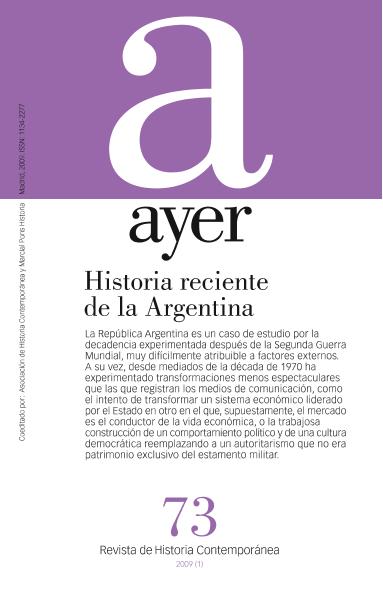Artículo
Desde un enfoque sociológico, el artículo propone analizar las relaciones entre el poder político y el poder eclesiástico en los últimos treinta años de la historia argentina. Teniendo en cuenta que las fronteras entre lo político y lo religioso han mostrado cierta porosidad, interesa desentrañar las lógicas subyacentes a un vínculo complejo que ha tenido consecuencias en la matriz política, cultural y social. La invariable disposición de la Iglesia católica a reproducir una presencia pública extendida supuso la intervención sobre vastos segmentos de la vida social. Los niveles de proximidad o de confrontación con cada gobierno estuvieron caracterizados por los márgenes otorgados desde la sociedad política para que la institución religiosa influyera en las políticas públicas y en la legislación con los principios de su doctrina. The article attempts to analyze the relationship between political power and ecclesiastical power from a sociological approach in the last thirty years of history of Argentina. Taking into account the permeable nature of the boundaries between politics and religion, the focus of the article is to unravel the logic behind a complex bond that has implications in the political, cultural and social matrix. The invariable readiness of the Catholic Church to play a widespread public role resulted in its intervention on large segments of social life. The levels of closeness or confrontation with each government changed. These levels operated within limits; the different limits granted to the religious institution by the political society to influence public policies and legislation with the principles of the doctrine of the church.
Estado e Iglesia Católica en la Argentina reciente: los términos de una compleja relación (1976-2007)
Fecha de publicación:
12/2009
Editorial:
Asociación de Historia Contemporánea
Revista:
Ayer
ISSN:
1134-2277
e-ISSN:
2255-5838
Idioma:
Español
Tipo de recurso:
Artículo publicado
Clasificación temática:
Resumen
Archivos asociados
Licencia
Identificadores
Colecciones
Articulos(CEIL)
Articulos de CENTRO DE ESTUDIOS E INVESTIGACIONES LABORALES
Articulos de CENTRO DE ESTUDIOS E INVESTIGACIONES LABORALES
Citación
Esquivel, Juan Cruz; Estado e Iglesia Católica en la Argentina reciente: los términos de una compleja relación (1976-2007); Asociación de Historia Contemporánea; Ayer; 73/2009; 1; 12-2009; 103-132
Compartir




